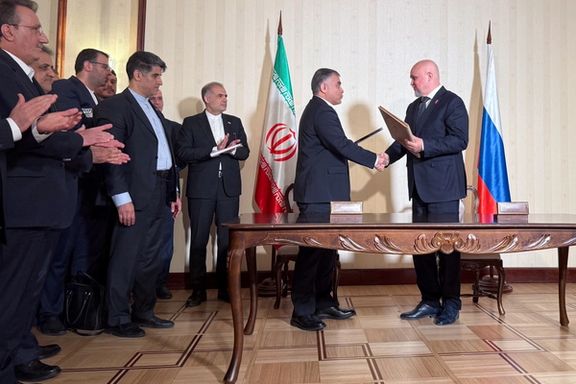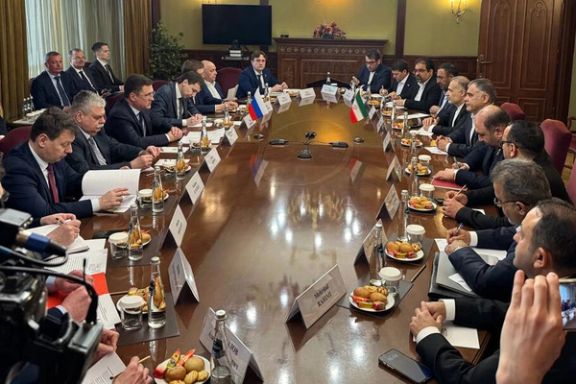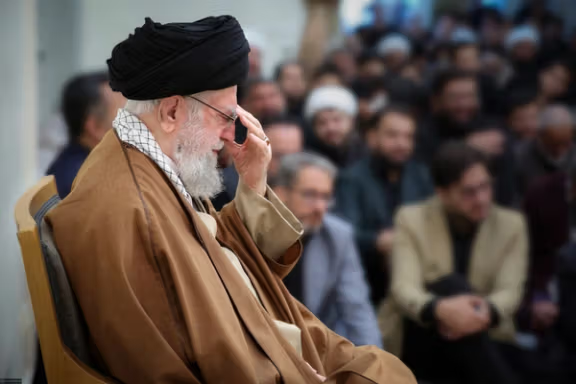Trump says open to meeting Iran's Supreme Leader or president

US President Donald Trump said he is open to meeting with Iran’s President or Supreme Leader, as Washington and Tehran continue indirect talks over Iran’s nuclear program.

US President Donald Trump said he is open to meeting with Iran’s President or Supreme Leader, as Washington and Tehran continue indirect talks over Iran’s nuclear program.
“Sure,” Trump said in an interview with Time magazine when asked if he would be willing to meet Iran’s top leaders.
The comments come as the third round of indirect negotiations is scheduled to take place on Saturday in Oman. The talks, which began earlier this month, aim to revive diplomacy after years of tension following Trump’s 2018 decision to abandon the 2015 nuclear deal between Iran and world powers.
"I think we're going to make a deal with Iran. Nobody else could do that," he said during the interview.
Earlier this year, Trump reinstated his administration’s maximum pressure policy on Iran, while also expressing openness to dialogue.
In February he also said he was prepared to speak with his Iranian counterpart and voiced hope for a peaceful resolution. “I really want to see peace, and I hope that we're able to do that,” Trump said at the time. “They cannot have a nuclear weapon.”
Iran maintains that its nuclear program is peaceful, but Trump has warned of catastrophic consequences if a new deal is not reached swiftly. He has also said military action remains a possibility to prevent Iran from developing a nuclear weapon.
In the Time interview, Trump rejected reports that he had stopped Israel from launching strikes on Iranian nuclear sites, but said he preferred a diplomatic solution. “I didn’t stop them. But I didn’t make it comfortable for them, because I think we can make a deal without the attack,” he said. “It’s possible we’ll have to attack because Iran will not have a nuclear weapon.”
Asked if he was concerned that Israeli Prime Minister Netanyahu might draw the United States into a broader conflict, Trump replied, “No.”

Iran's Supreme Leader Ali Khamenei should cleave toward a moderate approach toward the United States in ongoing talks, several prominent Iranian political commentators have suggested.
Instead of directly naming Khamenei, the commentaries were careful to use terms such as "leadership," "governance" and "decision-makers," as directly exhorting Iran's theocrat is mostly off-limits in public discourse.
Iranian nuclear scientist and former diplomat Ali Khorram, who served as Iran's ambassador to the UN headquarters in Geneva in the 80s, said in an interview with the pro-reform Arman Melli newspaper that Iran's leadership should take rational decisions which take into account future threats.
Khorram, who studied nuclear physics and international law in the United States, expressed optimism that US President Donald Trump could preside over a genuinely improved relationship
"Trump genuinely wants to improve relations between Tehran and Washington and elevate them to the level of friendship."
Reformist political commentator Abbas Abdi in an interview with pro-government reformist daily Etemad, said authorities should forge an agreement not just with the United States but with its own people.
"The people in Iran are no less important than an agreement with America" for the survival of the political establishment, he said.
Abdi highlighted the divide between the government and the nation, exacerbated by waves of protests since 2017 and the violent suppression of the demonstrators by security forces, and called for pluralism and improved governance.
"Almost certainly, the Iranian side has made a decision at the top level of the government to reach an agreement" with the United States, Abdi said, adding that the rapid progress in talks suggested that some essential agreements were already in place before the two sides met.
Heshmatollah Falahatpisheh, the former chief of the Iranian parliament's National Security and Foreign Policy Committee, told the pro-reform website Fararu that Tehran must abandon certain taboos if it seeks genuine progress.
"If Iran does not break those taboos, any achievement in the negotiations will not last long," he said.
The politician has previously spoken extensively about the need to move beyond Tehran's anti-Americanism, its reliance on China and Russia and its acknowledgment of past mistakes in its relationship with the Iranian people.
Iran's primary challenge, Falahatpisheh added, is on the home front, warning that persistent tensions could become increasingly costly.

Iran has finalized four agreements worth a total investment of $4 billion with Russian companies to develop seven oil fields, Oil Minister Mohsen Paknejad said.
During his visit to Moscow for the 18th session of the Iran-Russia Joint Economic Commission, Paknejad said on Thursday that the deals form part of broader efforts to expand strategic cooperation across sectors, including energy, finance, and agriculture.
“The potential for trade between Iran and Russia is far greater than the current $5 billion level,” he said, adding that additional memoranda of understanding are under negotiation in the oil and gas sectors. “Expert groups are actively working to finalize these talks and turn them into binding contracts.”
The oil minister also announced plans for a new nuclear power plant to be constructed in the country, financed by a credit line from Moscow.
Paknejad also said that discussions are underway on importing natural gas from Russia in an initial phase, followed by gas swaps and transit to other countries. “This is one of the key areas of interest for both sides,” he said. “We have had detailed negotiations, and only a few items remain before finalizing the first-phase import volumes.”
The minister added that the latest agreements follow the ratification of a long-term strategic cooperation treaty between Tehran and Moscow. “This is the first joint commission meeting since the treaty’s approval last week, and it opens new pathways for economic collaboration,” he said.

Separately, Saeed Tavakkoli, managing director of Iran’s National Gas Company, said progress has been made on an earlier agreement with Russia to transfer gas to northern Iran, where domestic production is limited. “This plan will help meet energy needs in northern provinces and contribute to Iran’s goal of becoming a regional gas hub,” he said.
Tavakkoli added that while further technical assessments are needed, current negotiations have been effective, and the project aligns with the targets of Iran’s seventh development plan.
The agreements come as Western sanction -- isolating Russia over Ukraine and Iran for its nuclear program, regional role, and human rights -- have spurred a rapid deepening of their ties.
Their shared predicament, alongside a common interest in countering US influence, underpins their growing partnership. Both nations are also exploring ways to bypass these restrictions, including using national currencies and alternative financial channels for trade.

A growing divide in Iran over how to approach negotiations between Tehran and Washington over Iran's nuclear program appears to have reached the office of Supreme Leader Ali Khamenei.
Khamenei has largely silenced Tehran's hardliners ahead of the third round of talks with Washington but some opposition persists within his own office.
Two newspapers funded and maintained by Khamenei’s office —Kayhan and Ettela'at —have been presenting starkly different perspectives on the talks over the past week. Both are among Iran’s oldest newspapers, and their top management is personally appointed by the Supreme Leader.
Kayhan, known for its consistently anti-US stance, has maintained a hardline, pessimistic view on the negotiations, even after Khamenei’s rhetoric softened in his recent speeches.
The newspaper insists that "the talks will lead to nowhere." Previously, the daily had writted "negotiating with the United States would be foolish." In a controversial satirical commentary, Kayhan even called for the assassination of President Donald Trump.
The newspaper’s editor, Hossein Shariatmadari, wrote on April 18 that "Iran is engaged in a hybrid war with the United States, and the Iranian government should adopt a combat posture against Washington."
Later, on April 22, the daily quoted IRGC-linked Defa Press website as saying, "Iran is sufficiently armed with top-secret weapons to attack Diego Garcia and confront US and British forces there. Iran’s Shahed-136 drones can reach Diego Garcia, located approximately 4,000 kilometers from its borders."
The report added, "Iran can set fire to Diego Garcia with its improved Khorramshahr ballistic missiles, while its cruise missiles can target massive U.S. vessels in the Indian Ocean."
Although the articles may be a mix of falsehoods, disinformation and wishful thinking, they appear to reflect abiding suspicions of the diplomatic outreach among hardliners.
'Embarrassing themselves'
Earlier, Ettela'at had welcomed the negotiations. In an analysis published on April 22, the newspaper sought to expose "those who are undermining the talks."
"Three groups in Iran are attempting to obstruct the negotiations. Although they are too weak to derail the process entirely, they might succeed in discouraging some people and embarrassing themselves."
In an apparent reference to previous Iranian governments and their leaders, Ettela'at identified the first group as "those who question why negotiations were not allowed when they were in power and could have claimed them as their own achievement."
The second group, according to the newspaper, consists of "those who equate negotiations and compromise with treason. They chant radical slogans, create tensions, and sometimes their rhetoric proves costly for the government. On occasion, they even incite small protests in the streets." T
This appeared to be a clear reference to ultraconservatives, such as members of the ultra-conservative Paydari Party and the editors of Kayhan.
The third group attempting to obstruct the negotiations, Ettela'at wrote, is "the foreign-based Iranian opposition," which the newspaper characterized as "bankrupt opportunists."
"Let us support détente and the ongoing negotiations," the daily insisted.
This development could be seen as an extension of Khamenei's "good cop-bad cop" strategy. However, the timing –just as negotiations continue—and the stark contrast between the two perspectives strongly suggest a deeper divide within Khamenei's office.
While pockets of resistance against a potential deal with Washington persist, some Iranians—such as sociologist Ebrahim Fayyaz—are already considering the aftermath of an agreement.
Characterizing the negotiations as inevitable, Fayyaz said in an interview with Khabar Online, "This is the first time Iranians are engaging in negotiations with a world power on equal footing."
At the same time, he warned that radical rhetoric from hardliners, particularly those affiliated with Iran’s state television, could point to serious internal instability.

Two university students were assaulted near their dormitory in Tehran on Wednesday, marking the latest in a series of attacks targeting students in the Iranian capital.
“The recent assault took place in a location with a history of similar crimes,” said Hamed Ali Sadeghi, Khajeh Nasir University’s deputy for student and cultural affairs. “These two were targeted by a specific gang,” he added.
Just days earlier, a female student from Shahid Beheshti University was attacked 50 meters from her dormitory in the capital’s northern Velenjak neighborhood. The robbers broke her teeth and stole her phone.
In February, 19-year-old Amir Mohammad Khaleghi, a business student at the University of Tehran, was stabbed to death by robbers near his dormitory.
Student associations warned afterward that the threat extended to dormitories across the country and criticized authorities for ignoring repeated calls to secure the surroundings of student housing.
Protests erupted following Khaleghi’s death, but attacks have continued. About a month later, two students at Tehran University of Medical Sciences were robbed at knifepoint.
According to the student council, the victims sought help from campus security after being threatened with cold weapons.
The pattern is not limited to student areas. On April 20, video circulated of a motorcyclist snatching a necklace from a woman carrying a child in southern Tehran, knocking both to the ground.
Last week, a surveillance camera recorded a thief tearing off a man’s gold chain as he sat at a café in Saadatabad, northern Tehran.
In Meybod, Yazd province, other footage showed a phone being violently stolen from a 16-year-old girl in broad daylight.
Iranian authorities have announced arrests in a few high-profile cases but have yet to introduce broad preventive measures.
Instead, universities have advised students to use better-lit, alternative routes — guidance viewed by many as an admission of official inaction.
The uptick in street crime comes as Iran’s economy remains in crisis. Inflation is estimated to have reached nearly 50 percent, while the rial has suffered a steep depreciation.
The exchange rate briefly hit 1,060,000 rials to the US dollar during recent weeks before temporarily falling to 800,000 following the resumption of indirect talks with the United States.
Over one third of Iranians now live below the poverty line and unemployment sits at around 20% for the country's young population and 7-8% overall, according to official data, although actual numbers are believed to be far higher.
Earlier this month, Ham-Mihan daily reported that food theft from stores in Iran has increased, with rising prices and growing hunger among the population cited as major reasons.
In September, Ali Valipour Goudarzi, head of Tehran’s Criminal Investigation Police, said that some thieves resort to theft solely due to economic conditions, and that if the situation improves, their numbers will decrease.

Iran's Ambassador to Beirut Mojtaba Amani visited Lebanon’s foreign ministry to walk back earlier comments which appeared to call the Mediterranean country's delicate efforts to disarm the Iran-back Hezbollah group a conspiracy.
Amani had initially declined an earlier summons but attended Thursday’s meeting following a backlash over a post last week in which he warned of a conspiracy threatening regional stability—widely seen as a reference to efforts to disarm Hezbollah.
Iran's embassy in Beirut said the post was general in nature and “applied to all countries without exception, including Iran,” and that the visit aimed to prevent “any misunderstanding or misinterpretation” between the two countries.
"Amani emphasized the need to prevent enemies from sowing discord between Iran and Lebanon, believing that vigilance and cooperation are the guarantees for warding off such attempts," the embassy said on its official X account.
The Lebanese foreign ministry confirmed the meeting and said senior official Hani Shmaytelli reminded Amani of “the need to adhere to diplomatic protocols … on the sovereignty of states and non-interference in their internal affairs.”
Last week Amani warned against what he called a disarmament conspiracy, saying on X: “We in the Islamic Republic of Iran understand the danger of this conspiracy and its threat to the security of the region’s peoples."
"We warn others against falling into the enemy's trap. Preserving deterrent capability is the first line of defense for sovereignty and independence and must not be compromised.”
In a televised interview earlier this week, Amani struck a more conciliatory tone, saying the issue of Hezbollah’s weapons was for the Lebanese government to decide. “We are committed to what the Lebanese agree upon,” he said.
Iran, the embassy quoted Amani as saying, maintains its "unwavering commitment to supporting the independence, sovereignty, stability and security of the Lebanese Republic."
The diplomatic exchange comes amid renewed pressure in Lebanon to disarm Hezbollah, which is designated a terrorist organization by the United States, United Kingdom, and European Union.
Lebanese President Joseph Aoun recently said the group should be brought under state control following losses in recent clashes with Israel. A US- and France-brokered ceasefire remains in place, though both sides have reported violations.